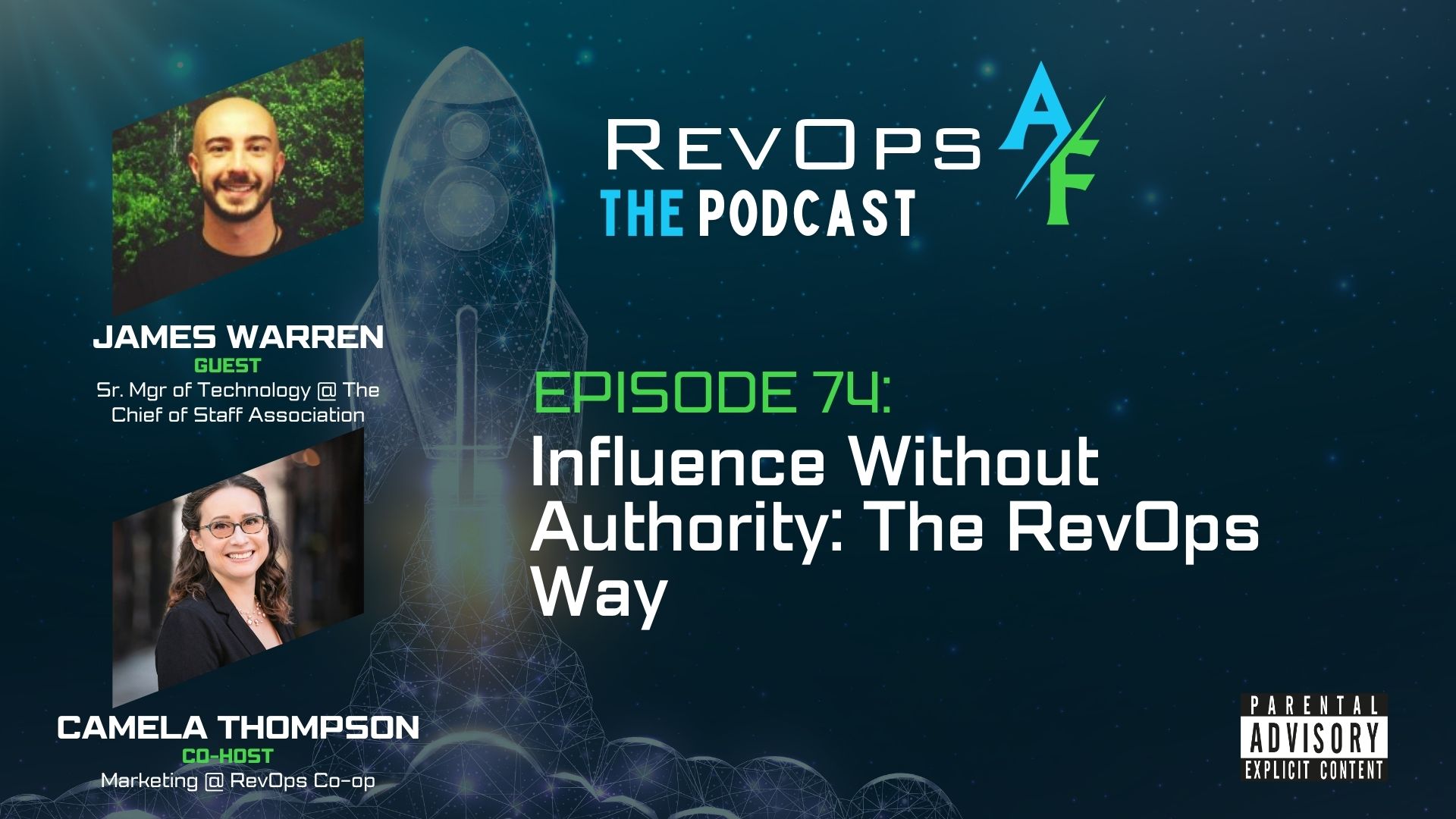
Episode 74: Influence Without Authority: The RevOps Way
Build RevOps influence without authority. James Warren shares strategies for stakeholder buy-in, agile methods, and going from reactive to strategic.
Welcome to the latest episode of the RevOpsAF podcast! Join our co-host, Camela Thompson, Head of Marketing and RevOps SME at RevOps Co-op, as she interviews former VP and Principal Analyst at Forrester, Steve Silver. Hear from Steve as he highlights market trends, changes in buyer behavior, and the critical role that RevOps plays in bridging organizational silos.
There are three macroeconomic shifts shaping the RevOps landscape. The first is a change in buyer behavior. Today, up to 80% of B2B buyers avoid interacting with sellers, instead opting for online research and transactions. Research papers, marketing content, and peer reviews are crucial for influencing buyer decisions long before they engage with sales. GTM teams need to align early to meet these expectations.
The second shift is a rapid advancement in technology. Powerful tools for sellers reduce manual data entry while providing insights into buyer behavior and account activities. In addition, the integration of AI functionality into revenue systems is accelerating and further enhancing the capabilities of RevOps teams.
Lastly, there’s a strong demand from stakeholders for profitable, sustainable revenue growth. RevOps professionals must focus on delivering value to customers while also ensuring sustainable and profitable growth.
"Buyers are doing more and more of their own work online... Marketing, sales, and customer success need to understand these expectations and deliver value accordingly." - Steve Silver
Jump to the clip to learn more about changing impacting RevOps.
RevOps professionals can play a pivotal role in fostering collaboration across sales, marketing, and customer success by creating a unified revenue ecosystem focused on the customer lifecycle. Integrating systems and processes that support collaboration and data sharing allows data to flow seamlessly between teams, enhances the overall customer experience, and helps organizations respond to changes in the market and buyer behavior.
"Marketing, sales, and customer success must work together to build a revenue ecosystem that delivers value throughout the entire customer lifecycle." - Steve Silver
Jump to the clip to learn more about RevOps' role in bridging department silos.
It’s mission-critical that RevOps align all priorities with the company strategy. This requires a thorough understanding of the company’s strategy, target markets, and revenue drivers. Delivering comprehensive insights about broader business objectives helps RevOps leaders make a meaningful impact on strategy.
To drive this, leaders must develop a charter. Creating a RevOps charter involves defining the roles, responsibilities, and objectives of the RevOps team. Review your charter with key stakeholders, including senior executives, to ensure alignment and support.
"Developing a RevOps charter and aligning it with the company's strategy is crucial for setting the tone and direction of the RevOps team." - Steve Silver
Jump to the clip to learn more about alignment and creating a charter.
Small RevOps teams face unique challenges, like balancing priorities and effective project management. RevOps leaders must carefully balance and prioritize high-impact activities that align with the values and objectives of company executives in order to secure support and resources.
Implementing project management systems, like Asana, can help small teams stay organized and communicate their priorities effectively. Make sure to schedule regular review meetings with stakeholders to stay in alignment.
"Small RevOps teams must be strategic in balancing their priorities and use project management tools to communicate effectively and stay organized." - Camela Thompson
Jump to the clip to hear more of Steve's perspective on the challenges that are unique to smaller teams and how to overcome them.
As RevOps roles and responsibilities continue to evolve alongside AI advancements, RevOps will become a critical strategic partner and influence at organizations seeking to optimize revenue processes and adapt to market changes. The growing recognition of the value RevOps delivers will lead to a global expansion as more organizations seek RevOps expertise.
"The future of RevOps is bright. As the profession evolves, there will be more opportunities for growth and influence within organizations." - Steve Silver
Jump to the clip to hear Steve’s outlook for RevOps as a profession.
Our average member has more than 5 years of RevOps experience. That means you’ll have real-time access to seasoned professionals. All we ask is that you’re generous with your knowledge in return.